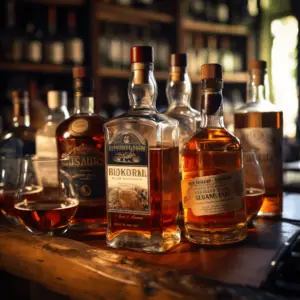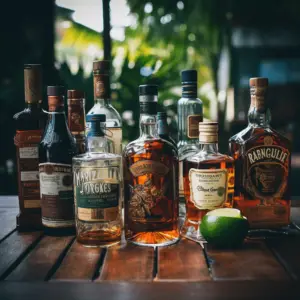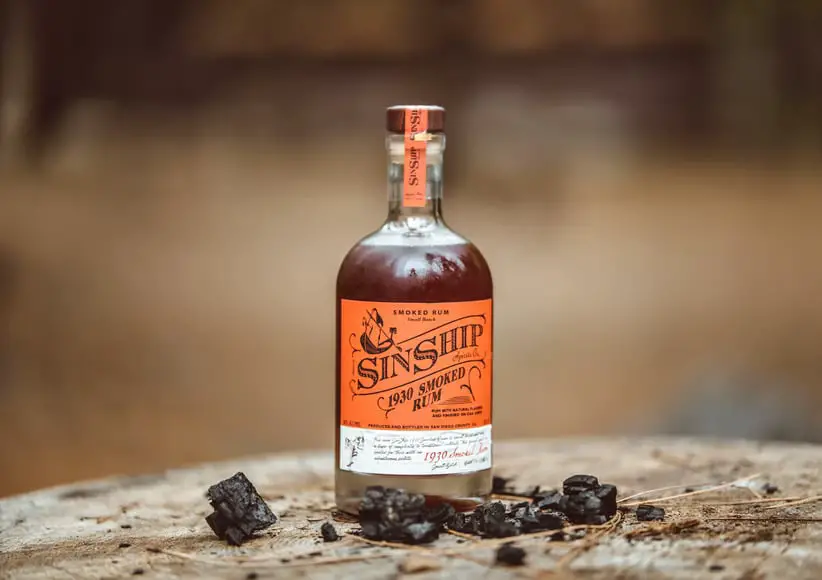Rum Aging Misconceptions, How long does rum last once opened? A common question most of us find asking ourselves and well, Forever seems to be the most suitable answer.
Okay, maybe not eternity but there is no such thing as rum going bad once it has been opened. Unopened rum will remain in excellent condition for decades and possibly centuries.
Opened rum does not go bad either unless it is stored without being corked back up or placed outside in the sun indefinitely. Light and heat could have an effect on opened rum but even then it does not go bad the same way milk would and become unsafe for human consumption.
Opened rum may change but drinking it is perfectly safe. The change will be a matter of quality, not safety since exposed rum may lose taste and flavor making it unpalatable.
Table of Contents
Rum Aging Misconceptions

That said even if it were safe to consume the deteriorated product it is inconceivable why you would consume alcohol that has no pleasurable taste, to begin with.
To avoid ruining a perfectly good liquor, simply cork back the bottle and store it in a cool dry place to preserve the drink in stellar condition.
In this state, rum will still take years to change in any discernable way and your half-empty bottle of Barcardi will remain the same twenty years on.
Rum Aging Misconceptions is important to note that this only applies to pure rum. As long as the rum in question is 40% alcohol by volume or more, it will not go bad it will only change imperceptibly in taste.
Rum Aging Misconceptions the rum is flavored such as is the case with coconut rums and honey rums that have recently become a popular feature in the alcohol industry then you will be dealing with a rapidly deteriorating drink that will lose its flavor that much faster.
These kinds of rum-based brands should be consumed within months of being opened and are unlikely to last years. The additives are the culprits and when broken down are likely to cause stomach disturbances. The rum itself is not a problem.
What is rum anyway?
Rum is a distilled liquor made by fermenting sugarcane molasses or sugarcane juice.
The distillate produced from this process is basically what is called rum once it has been aged in oak barrels.
Unlike most other distilled liquors rum has no standardized process and all rum producing countries or regions have processes unique to them making rum available in various colors, flavors, and qualities.
That said, most authorities require that rum is aged for at least a year before it is distributed to the masses obviously having undergone more thorough testing and evaluation to ascertain safety.
There are different kinds of rum with the most common classifications being based on color and flavor. The kinds of rum available include:
- Dark rums
- Brown rums
- Gold rums
- Flavored rums
- Light rums
- Overproof rums
- Spiced rums
- Premium rums
- Clear rums
A common misconception about rum is that it is brown or dark.
As the list above shows, rum is much more versatile and rum aged in stainless steel casks is virtually colorless.
Some of the darker rums are not even the result of aging in wooden casks but are the product of blending with flavors and colorants that produce this color.
A common additive that is used to achieve this is caramel and this is commonly done to give rum the much beloved and trusted appearance of a golden brown hue.
Another misconception is that it ages and gets better with time. This is also untrue. Once the distillation, aging, and blending processes at the processing factory are over, rum does not change one bit.
Rum Aging Misconceptions will stay the same as long as it is unopened but it will not continue to improve in taste or flavor once it has been bottled.
Rum Aging Misconceptions
Most rum producing countries age rum in bourbon or oak casks but with emerging technologies in food and beverage, aging alcohol is fast becoming the preserve of various proprietary methods that employ the mechanisms of light, heat, and bacterial cultures to achieve the same effect as aging in casks.
Apart from the obvious benefit of making commercially produced alcohol in volumes large enough to sustain the massive alcohol industry, it goes without saying that aging alcohol in casks is likely to be too expensive and impractical over time, and with the ever-expanding population, the time factor involved in the aging process makes aging rum the traditional way a herculean task.
In many countries, black market production of alcoholic drinks, rum included has called for even greater innovation in the aging process to eliminate the vacuum created by the slower traditional aging process.
While it cannot altogether be rushed, artificial aging is key to properly regulating the industry and making sure black market illicit brewing does not take advantage of partakers by cashing in in this regard.
Is alcohol consumption beneficial?

Alcohol consumption is indeed harmful but often you will come across literature exalting the values of taking alcohol in small amounts. Some of the benefits of taking rum are said to be;
- Fighting colds snd coughs
- Keeping the body warm
- Relieving muscle pain
- Is a great antiseptic
- Can prevent cancer
- Thinning blood and preventing heart disease
- Extending life expectancy among others.
The fact of the matter is that alcohol consumption is a pass time and the effect that alcohol has on the brain is pleasurable to the point of becoming addictive if left unchecked.
Any health benefits that are accorded to alcohol are at best a justification for alcohol use and any one of those benefits can accrue from any number of safer alternative sources including a warm blanket or a jacket for the cold seasons, exercise, detoxing, fasting, eating healthy, pharmacological cough medicine or a honey and lemon mixture if need be, Purell and deep tissue massages for your muscle pain.
This case does not prevent cancers or prolong life and no empirical evidence says it does. Alcohol increases the likelihood of certain cancers and definitely threatens life expectancy when taken in irresponsible amounts.
Alcohol consumption is best done moderately and should be used as a social lubricant not for the so-called health benefits.


